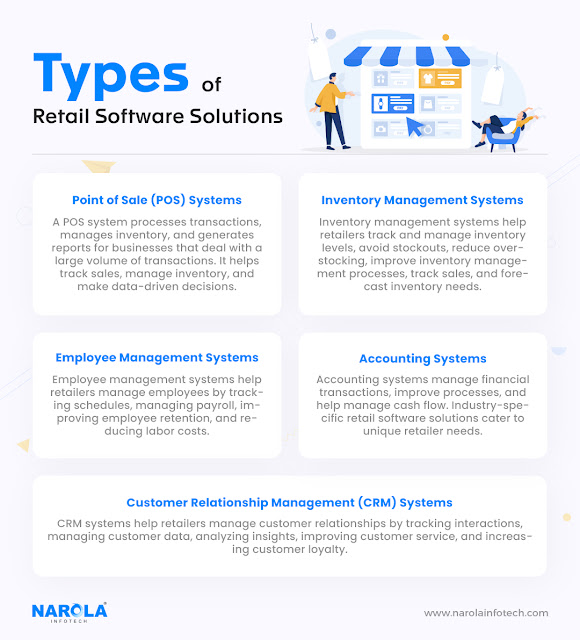In today's fast-paced retail industry, businesses rely heavily on technology to streamline operations, enhance customer experiences, and drive growth.
One crucial aspect of retail technology is retail software solutions. These software applications provide various functionalities tailored to meet the specific needs of retailers.
Let's dive into some of the essential types of retail software solutions that empower businesses in this dynamic sector.
Point of Sale (POS) Systems
Point of Sale systems is a fundamental component of
any retail business. They enable businesses to process transactions, manage
inventory, and generate sales reports.
Modern POS systems often incorporate advanced
features such as barcode scanning, integration with payment
gateways, and customer relationship management (CRM) capabilities.
Cloud-based POS solutions have gained popularity
due to their accessibility, scalability, and real-time data synchronization
across multiple stores or channels.
Inventory
Management Software
Inventory management software helps retailers
efficiently manage their stock levels, track product movements, and optimize
inventory across different channels.
These solutions provide real-time visibility into
inventory, automate replenishment processes, and generate reports for better
decision-making.
With features like demand forecasting, barcode
scanning, and automated alerts for low stock levels, inventory management
software enables retailers to avoid stockouts and overstock situations,
improving operational efficiency.
Customer
Relationship Management (CRM) Systems
CRM systems play a pivotal role in retail by
helping businesses nurture customer relationships and deliver personalized
experiences.
These software solutions store customer
information, purchase history, and preferences, allowing retailers to segment
their customer base and implement targeted marketing strategies.
CRM systems enable retailers to engage with
customers through various channels, including email, social media, and loyalty
programs, fostering brand loyalty and driving repeat sales.
E-commerce
Platforms
With the exponential growth of online shopping,
e-commerce platforms have become essential for retailers. These platforms
provide a digital storefront where businesses can showcase and sell their
products to a global customer base.
E-commerce
software solutions offer features like shopping cart functionality, secure
payment gateways, inventory synchronization, and order fulfillment
capabilities.
They also support digital marketing initiatives
such as search engine optimization (SEO) and social media integration, enabling
retailers to expand their online presence.
Business
Intelligence (BI) and Analytics Tools
Retailers generate vast amounts of data from
various sources, including sales transactions, customer interactions, and
website traffic.
BI and analytics tools help retailers make sense of
this data, providing actionable insights for strategic decision-making. These
solutions enable retailers to analyze sales trends, identify top-performing
products, track customer behavior, and optimize pricing strategies.
By leveraging data-driven insights, retailers can
gain a competitive edge and make informed business decisions.
Conclusion
Retail
software solutions have revolutionized the way retailers operate in
today's competitive market. From managing sales transactions to optimizing
inventory levels and nurturing customer relationships, these software
applications offer a wide range of functionalities.
By implementing the right combination of retail
software solutions, businesses can streamline operations, enhance customer
experiences, and drive growth in an increasingly digital retail landscape.
Don’t
Miss to Read

Comments
Post a Comment